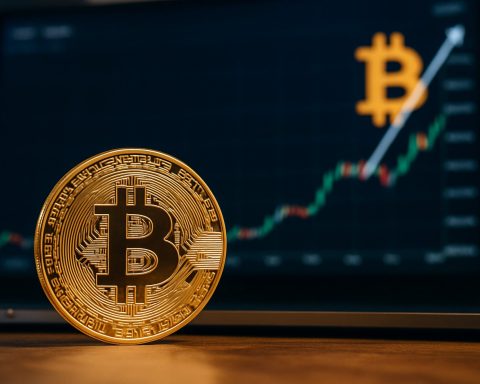- Bitcoin has surged past $95,000, driven by geopolitical shifts, regulatory clarity, and dollar fluctuations, highlighting its potential to impact traditional finance.
- A diplomatic detente between the U.S. and China has reduced economic anxieties, boosting Bitcoin’s status as “digital gold” with increasing institutional support.
- Traditional gold prices have also soared, suggesting synchronized growth with Bitcoin, encouraging large-scale investments and policy reform.
- The SEC, under Paul Atkins, proposes clear regulations for digital assets, attracting significant institutional investments into Bitcoin ETFs.
- Twenty One Capital, backed by major financiers, and Japan’s Metaplanet are amassing Bitcoin reserves, signaling aggressive market strategies.
- Vitalik Buterin proposes changes to Ethereum’s architecture to enhance efficiency, aiming to revolutionize blockchain-based tokenization.
- Recent DeFi hacks highlight security risks, emphasizing vigilance in digital asset protection.
- Ark Invest forecasts Bitcoin reaching $2.4 million by 2030, driven by scarcity, institutional adoption, and regulatory advancements.
- Bitcoin’s trajectory indicates a fundamental reshaping of financial systems, ushering in a new era of financial evolution.
Amid the swirling global uncertainties and economic tensions, Bitcoin has soared past the $95,000 mark, igniting a wave of optimism and redefining investment landscapes. This robust resurgence is fueled by a perfect storm of geopolitical shifts, regulatory clarity, and dollar fluctuations, painting a compelling picture of cryptocurrency’s potential to overshadow traditional financial models.
At the heart of Bitcoin’s meteoric rise is a significant diplomatic thawing between superpowers, the United States and China. With former President Trump easing up on tariffs, this detente has reduced global economic anxieties. Investors, ever on the hunt for stability amidst volatility, are turning their eyes towards Bitcoin, a digital fortress of sorts, often hailed as “digital gold” given its limited supply and increasing institutional backing.
Mirroring this ascent, traditional gold has also reached new heights, skyrocketing to over $3,400 per ounce, highlighting a parallelism that analysts at QCP Capital say could herald a new era of synchronized growth between these two assets. The collective upward thrust is more than just a blip on the investment radar; it’s fostering a fresh landscape ripe for large-scale investments and policy reform.
Adding fuel to this fire is the Securities and Exchange Commission’s (SEC) new chair, Paul Atkins, who has announced a groundbreaking initiative to establish a transparent regulatory framework for digital assets. His approach marks a significant departure from his predecessor, Gary Gensler, whose tenure was criticized for creating uncertainty in the nascent industry. Atkins, alongside Commissioner Hester Peirce, is set to collaborate with Congress and the presidential administration to draft clear and principled guidelines that companies in the sector can confidently navigate.
This regulatory shift has caught the eye of institutional investors, evidenced by unprecedented capital inflows into U.S.-based Bitcoin exchange-traded funds (ETFs). In a single week, a staggering $3 billion poured into these funds, a testament to the growing institutional appetite for cryptocurrency. BlackRock’s iShares Bitcoin Trust, a standout recipient, amassed $643.2 million in one day, affirmed as the “Best New ETF” in recent awards.
The revolution doesn’t stop there. Twenty One Capital, backed by financial titans like Tether and SoftBank, is poised to become a behemoth in corporate Bitcoin accumulation, echoing the aggressive strategies of Michael Saylor’s companies. Meanwhile, Japan’s Metaplanet is racing to fortify its Bitcoin reserves, marking significant progress toward its ambitious 2025 goal.
On the innovation frontier, Ethereum’s co-founder, Vitalik Buterin, has floated a radical proposition to overhaul Ethereum’s existing language architecture, aimed at enhancing execution speed and efficiency. With the prediction that blockchain-based tokenization could envelop $4 trillion in real estate by 2035, the march of technological evolution seems inexorable.
Yet, with great opportunity comes the specter of risk. Recent hacks in the DeFi sector serve as cautionary tales in the fight for digital security. The breach of the Loopscale protocol on Solana, resulting in $5.8 million in losses, underscores the vigilance required in protecting digital assets from malicious actors.
In this sea of change, Ark Invest forecasts a bold future for Bitcoin, pegging its potential value at $2.4 million by 2030, thanks to its evolving status as a store of value akin to gold. Their analysis suggests that a combination of scarcity, growing institutional acceptance, and innovative regulatory measures could propel Bitcoin to unprecedented heights.
As such, Bitcoin’s recent trajectory suggests more than just bullish sentiment; it hints at a fundamental reshaping of how financial systems perceive value. In a world craving stability and transparency, Bitcoin, alongside traditional safe havens, offers a glimpse into a new era of financial evolution. The message is clear: whether as a hedge against economic turbulence or as part of a diverse investment strategy, the era of digital gold has truly begun.
The Digital Gold Rush: How Bitcoin’s Rise Signals a New Era in Investment
A Closer Look at Bitcoin’s Surge and What It Means for Investors
Bitcoin’s recent surge past the $95,000 mark has not only caught the attention of global investors but also reshaped the landscape of digital and traditional investments. This meteoric rise is accompanied by geopolitical shifts, regulatory clarifications, and significant movements in the value of the dollar. Let’s delve deeper into this scenario to uncover more about Bitcoin’s influence and future potential.
Key Factors Behind Bitcoin’s Growth
1. Geopolitical Developments:
– The thawing diplomatic relations between the U.S. and China have reduced global economic tensions. President Trump’s reduction of tariffs has played a pivotal role in this development, highlighting Bitcoin as a safe haven during economic instability.
2. Regulatory Shifts:
– Under Paul Atkins, the SEC is leading efforts to create a consistent and clear regulatory environment for digital assets. This move is crucial for building trust among institutional investors and ensuring steady inflows into cryptocurrency markets.
3. Institutional Involvement:
– The significant inflows into Bitcoin ETFs, particularly BlackRock’s iShares Bitcoin Trust, indicate that major financial institutions are increasingly comfortable investing in cryptocurrencies.
Unexplored Insights and Trends
– Bitcoin vs. Gold:
– Both Bitcoin and physical gold have surged recently, suggesting a trend towards combined investments in these assets. This parallel growth indicates potential opportunities for diversification in investment portfolios.
– Market Forecasts & Industry Predictions:
– Ark Invest’s forecast of Bitcoin reaching $2.4 million by 2030 suggests Bitcoin will continue to evolve as a major player in the finance world. This underscores the importance of innovation, solid regulatory frameworks, and institutional adoption in driving future growth.
– Technological Advancements:
– Ethereum’s potential revamp of its language architecture could lead to improved blockchain efficiencies, further solidifying the foundation of decentralized finance (DeFi) platforms.
How-To Steps & Life Hacks for Investors:
1. Diversify Investments:
– Consider balancing your portfolio with both Bitcoin and traditional assets like gold to hedge against volatility.
2. Stay Informed:
– Follow regulatory updates and institutional investment trends to make informed decisions. Websites like Coinbase provide valuable insights and news on cryptocurrencies.
3. Security Measures:
– Utilize secure digital wallets and stay updated on the latest security advancements to protect your investments from potential breaches.
Real-World Use Cases
– Corporate Investment:
– Companies like Twenty One Capital are leading the charge in corporate accumulation of Bitcoin, mirroring strategies seen in firms run by industry figures like Michael Saylor.
– DeFi and Real Estate Tokenization:
– The potential for blockchain-based tokenization in real estate is immense, with predictions aiming for $4 trillion by 2035. This suggests opportunities for integration with traditional investment sectors.
Controversies & Risks
– Security Concerns:
– Recent DeFi hacks serve as stark reminders of the vulnerabilities in digital asset security—underlining the necessity for rigorous security protocols.
– Regulatory Uncertainty:
– Despite recent advancements, the evolving regulatory landscape can pose challenges. Keeping abreast of changes is key for investors.
Actionable Recommendations
– Leverage Education:
– Dive into educational resources to better understand cryptocurrency and blockchain technology. Knowledge is crucial in navigating this rapidly changing terrain.
– Build a Balanced Portfolio:
– Align investment strategies with your risk tolerance and financial goals. Explore both digital and traditional assets for a comprehensive approach.
– Engage with Communities:
– Participate in forums and investment communities to exchange insights and strategies. Communities on platforms like Twitter and Reddit can provide diverse perspectives.
As Bitcoin’s trajectory continues to redefine financial systems, stakeholders are challenged to adapt to this new era where digital and traditional assets converge. Whether for hedging against economic turmoil or for embracing futuristic investment strategies, the time to consider digital gold has arrived.








